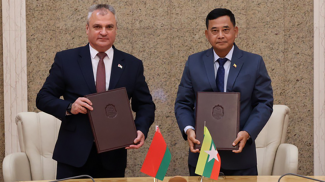MINSK, 27 July (BelTA) – Belarus' Deputy Minister of Foreign Affairs Yuri Ambrazevich has delivered a speech at the high-level plenary meeting of the Beijing Forum on Human Rights 2022, BelTA informs.
The diplomat noted that the last few decades witnessed human rights becoming one of the most divisive issues in international relations. Liberal democracies assert that their views on human rights are indisputably correct. They further argue that the embrace of human rights by liberal societies predetermines the latter's successful development. Moreover, liberal democracies contend that politics and practices they regard as flouting human rights stand in the way of development and achievement of the SDGs.
Why human rights do not depend solely on an individual
According to Yuri Ambrazevich, debates on whether liberal democracies have a good ground to claim to hold some ultimate truth on human rights have been underway for long. In this discussion Belarus adheres to its own position without questioning the value of the human rights concept per se.
“The concept of human rights is an embodiment of rules ensuring that an individual's dignity and freedom are protected from arbitrary action. Notwithstanding, the concept would only be a theory if an individual did not enjoy the most fundamental right of all – the right to a decent life without suffering. Absent this “safeguard”, all other human rights would be meaningless. Once born, a human being becomes a member of society. His or her rights become intertwined with the rights of others. What is more, those rights become integrated into a complex societal structure. By means of society-led state institutions this structure essentially strikes a balance between selfishness and physical differences inherent in human nature, on the one hand, and perceptions of a common good as taken by a particular society, on the other,” Yuri Ambrazevich said.
On social justice
Every society forges its own unique sense of the common good on the basis of its own evolution, the Belarusian diplomat noted.
The way a particular society views the notion of the common good actually stems from the way it perceives the notion of social justice. “Social justice has always been a hard and contentious choice for a society on how it could support its vulnerable, and on how it could provide a level playing field for everyone. Social justice has always been as much about income redistribution as about the relationship between individual and public interests, which often part ways. Therefore, the common good is always about constraints on individual rights and freedoms voluntarily accepted by the society,” Yuri Ambrazevich said.
“A human being enjoys absolute freedom and is legally entitled to unlimited egoism perhaps only at the moment of birth. The further he or she moves from his or her mother's womb, the greater is the level of constraints that society imposes on this individual,” the deputy foreign minister noted.
On a state as a donor for an individual's development
According to Yuri Ambrazevich, these reflections take us to an obvious conclusion that it is a particular society, represented mainly by state-led institutions, which serves as a donor for an individual's development as well as a guarantor for the realization of his or her rights to the extent determined by the common good.
“Basically, every country, be it a liberal democracy or an absolute monarchy, is doing its best to protect human rights and freedoms insofar as it has an interest in encouraging every individual to develop, in making use of his or her creative energy, in keeping society stable, in ensuring that the common wellbeing grows sustainably through individual success stories. Yet, every state stands as a structure created by the society with the objective to maintain a dominating notion of the common good and, if necessary, to enforce it,” Yuri Ambrazevich said.
According to him, every day all states without exception, be it the USA, Germany, Belarus, China or Saudi Arabia, regulate individual and public interests, not lest by resorting to force. At the same time, all countries differ in how they see their dominant concepts of the common good, social justice, balance of individual and public interests, as well as in understanding what acceptable levels of enforcement authorities may exercise.
On failure to achieve a perfect international standard
Attempts to universalize the human rights concept through international treaties has actually failed, the Belarusian diplomat noted.
“Suffice it to recall that the United States, a most ardent defender of universalism, is party to just three of the United Nations' nine conventions on human rights. Hence, the second conclusion is that there is no way to arrive at a universal consensus on some ideal or acceptable international standard whereby the human rights concept should be realized, the deputy foreign minister believes.
“Proceeding from the truly valid classic question “Who are the judges?”, a third conclusion that comes to mind is that there is no chance whatsoever to establish a universal international arbitrator who would determine the extent to which countries comply with international human rights tools,” Yuri Ambrazevich noted.
In his view, these conclusions clearly reveal that the claims by the so-called liberal democracies and by international institutions paid by the former, to have a position of monopoly in gauging human rights activities by other countries have been both groundless and prejudicial.
On desacralizing human rights in international relations as a kind of utopia
Yuri Ambrazevich went on saying that in this light an alleged “conventional wisdom” that countries finding themselves on the receiving end of the West's human rights-related criticism make little or no economic and social progress does not stand any criticism. For example, China made an astonishing progress in eradicating absolute poverty over the past eight years.
The diplomat expressed his conviction that the human rights concept as realized in a particular country and as based on its specific features, can and should serve this country's sustainable development. “International cooperation on human rights issues can also serve this end, provided that it complements national efforts and focuses exclusively on how to make national practices better. Unfortunately, human rights in today's world serve as the pretext for economic sanctions and even hybrid wars. Human rights' international dimension does not only fail to contribute to the global effort to attain the SDGs, it actually slows this work,” the diplomat continued.
“Therefore, what makes sense is to talk about “desacralizing” human rights in international relations as a kind of utopia that cannot be realized in practice,” he noted.
Moreover, he suggested “de-instrumentalizing” international relations on human rights and gradually moving them in the format of voluntary UPR-like reviews.
The Beijing Forum on Human Rights is a global human rights forum that has been held at the initiative of the China Society for Human Rights Studies since 2008. The event brings together politicians, high-ranking officials, well-known human rights experts from many countries, regions and international organizations. The theme of the Beijing Forum 2022 is “Working Together Towards Fairer, More Equitable, Smarter and Inclusive Global Human Rights Governance”.













